Of King David’s Women: Tamar, Symbol of Survival
Of King David’s Women: Tamar, Symbol of Survival
The date palm speaks of justice and survival in the biblical world of #MeToo
On this upcoming Tu B’Shvat, the New Year of Trees, my thoughts go to King David’s daughter Tamar, whose name means date palm. Tamar was raped, then scorned and cast out by her half-brother (2 Sam. 13). Ironically, the tree for which Tamar was named is a biblical symbol of survival, of life itself, thriving as it does in oases, surrounded by desolation, seen from a distance by parched and desperate travelers. In its bounty it is compared to the rewards of righteousness (Psalm 92:13) and to justice (Judges 4:5).

“The Rape of Tamar,” Alexander Cabanel, 19th century. Wikimedia Commons.
Its scientific name is Phoenix dactifera. In this name, we can find a symbol of hope as well. Some say the legendary phoenix – the bird who ended its life in a blaze and whose successor rose from the ashes – might have gotten its name from a characteristic the bird shares with the date palm: After a fire, it is reborn from shoots that spring from its innermost surviving parts.
The date palm as a “giving tree” became a symbol in early Christianity and in Islam as well. An infancy narrative attributed to St. Jerome depicts Jesus, Mary and Joseph in the desert. When Mary says she is hungry and thirsty, the baby Jesus commands a date palm to bend down, give his mother its fruit and reveal a spring of pure water. The Quran also tells this story.

Among the magnificent mosaics discovered in 1992 at the Kathisma, The Church of Mary’s Seat, on the Jerusalem–Bethlehem road, is this date palm that immortalizes the legend of Mary’s “giving tree.” Courtesy of Dr. Rina Avner.
The courtroom of the biblical heroine Deborah was under a date palm, and so the tamar became a symbol of justice. But for David’s daughter, there would be no true justice in the biblical telling. Her brother Absalom meticulously planned and executed his revenge on her attacker, but even this he did not share with his sister. His advice to her sounds all too familiar: Just put it behind you. Don’t tell anyone. As for David, when he heard what happened, he “became angry.” No more. Neither man gave Tamar what we now know victims need most after such a trauma – recognition, validation, comfort.
Tamar as a Flower
Tamar has entered the botanical world not only in the name of a tree, but, oddly, together with her attacker, as a flower: the pansy. In Hebrew it’s known as Amnon v’Tamar, by way of a Russian legend about a brother and sister, Ivan and Maria (which is the name for pansy in Russian), separated in childhood, who are reunited as adults and fall in love. God takes pity on them and turns them into a two-tone blossom, each symbolizing a different color, so they can stay together forever. These star-crossed Russian lovers were transformed into a prince and princess of Israel, abuser and victim, by none other than the Russian-born Hebrew poet Shaul Tchernichovsky, who translated the legend into Hebrew and sought a biblical name and theme for his protagonists.

Pansy. The gold is Tchernichovksy’s Tamar (Maria in the Russian legend); the purple, Amnon (Ivan). Wikimedia Commons.
Absalom killed Amnon, and fled from his father. And David mourned. Not because one son had killed another, but because David longed for Absalom. Did David also long to have acted differently? Did he regret not having spoken up for his daughter and punished Amnon with his own hand (Ecclesiastes Rabbah 7:3)?
Where is David’s mourning for Tamar? Where, indeed, is she? Must her only trace after the crime against her be in her name – given by Absalom to his daughter, perhaps out of guilt over abandoning his sister?
Hope in the Future
This is where I want to go in my next historical novel. According to an ancient legend I’ll be weaving into it, Tamar was once again threatened, and once again, it happened in the place where she should have felt safest, among her own family (this time, on her mother’s side). But this story ends in hope. This Tamar, who once placed ashes on her head in mourning, like the women in my first historical novel, The Scroll, will rise from the ashes.

Big Tamar with little Tamar and her mother Maya, cutting cookies, shaping the future, 2015.
As did Tamar, my mother-in-law and who passed away just three months ago at age 87. Tamar was her adopted name. When she was about 16, after the liberation of the Budapest ghetto where she survived the Holocaust, Vera, as she was known then, cared for orphaned Jewish children getting ready to go to Palestine. The group’s leaders gave everyone a Hebrew name, to prepare for the future they hoped for in the land of their ancestors. “You’ll be Tamar,” they told her, because you’re tall and lovely like a tamar“– a date palm (Song of Songs 7:7–8).
Like Tamar, the daughter of David, my mother-in-law was left unprotected in a world of unimaginable cruelty, and she rose from the ashes to reestablish her family – our family. Let’s work so that her great-granddaughter, also named Tamar, the descendent of strong, heroic women on both sides, will know a better world.

Further reading
Pseudo-Gospel of Matthew, Chapter 20. http://gnosis.org/library/psudomat.htm.
Philologos. “Named for a Rapist.” The Forward, Feb. 24, 2010. https://forward.com/culture/126322/named-for-a-rapist/
Feinberg-Vamosh, M. Food at the Time of the Bible. Herzliya, Israel, n.d. P. 40.
Lowin, S.L. Arabic and Hebrew Love Poems in Al-Andalus. New York, 2013.

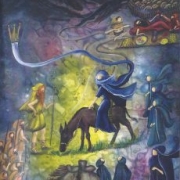
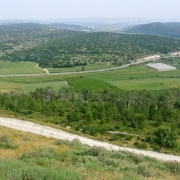
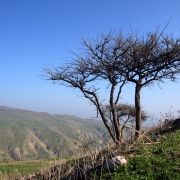
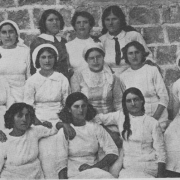
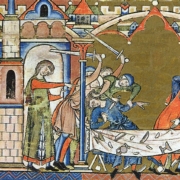
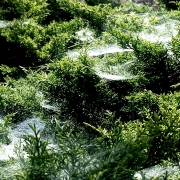
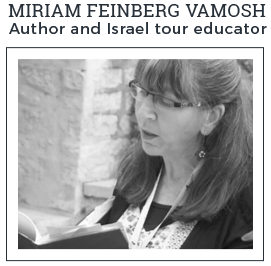
I did not know this about Big Tamar.
What a lovely and inspiring tribute to all the Tamara! You write as methodically as you speak, my friend.
Yes, I love that story about Big Tamar and how she got her name after the Holocaust, and I promised myself I’d keep alive. Little did I know she would come to me while I was writing about Tamar of the Bible and remind me to tell it. Thank you so much for your comment!
As we go into the new week I am so glad I read your blog post about Tamar in the Bible and how we need to revise her story as women. Women continue to face abuse to this day! Thank you Miriam for another up to date biblical story.
I am a serious fan of the date fruit but really enjoyed reading about all the other “Tamar’s” in your post 🙂 I loved your mother-in-law’s story and would enjoy reading more about her.
Thank you, Marina!